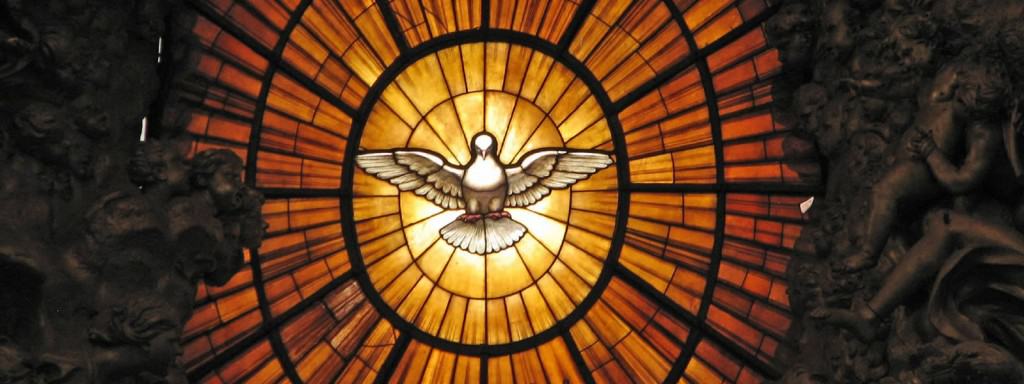Pentecost, which we celebrate this Sunday, is the liturgical season after Easter. It celebrates the descent of the Holy Spirit upon the Church. Pentecost begins the eighth Sunday, or 50 days, after Easter Sunday. The descent of the Holy Spirit ushered in a new era for the people of God.
The Jewish History of Pentecost
“Pentecost” is from Greek meaning “fiftieth.” The name Pentecost was originally given to the Jewish Feast of Weeks which fell on the fiftieth day after Passover. On this day, the first fruits of the grain harvest were offered to the Lord (Leviticus 23:15-21 and Deuteronomy 16:9-11). The second chapter of Acts begins by noting that the Feast of Weeks had just passed.
The Day of Pentecost in Acts
In Acts 2:1-41 the Holy Spirit descended upon the Apostles. This occurred ten days after Jesus’ Ascension. Jesus had asked his Apostles to pray, and their nine days of prayer can be considered as the first novena.
Let’s look at the biblical account of Pentecost in detail.
Miracles the Apostles Experienced
When the Holy Spirit descended on the Apostles, they preached the Good News of Jesus Christ. Miraculously, people of many different languages and nations could understand the Apostles in their own languages. This miracle reflected God’s desire for the Gospel to be preached to all, and for all the peoples of the earth to be united in faith. The Collect (opening prayer) of the Pentecost Mass prays:
Almighty ever-living God, who willed the Paschal Mystery to be encompassed as a sign in fifty days, grant that from out of the scattered nations the confusion of many tongues may be gathered by heavenly grace into one great confession of your name.
Another wonder surrounding Pentecost was that tongues of fire appeared and rested on the Apostles. God left no doubt that Pentecost was an important event in the history of the Church and that the Holy Spirit was truly present.
The Most Important Effect of Pentecost
The miraculous tongues of fire, along with the Apostles’ ability to speak in different languages, may seem to be the most impressive signs of Pentecost. However, the most important and most lasting effect of Pentecost went deeper than that.
Peter, the leader of the Apostles, stood in front of the crowds and preached. He preached with boldness and conviction. Consider that up until this point the Apostles had not preached at all. Just 10 days before, the Apostles still thought that Jesus’ mission was to restore an earthly kingdom to Israel (cf. Acts 1:6). Now, however, Peter recognizes the mission of Jesus and boldly preaches instead of remaining hidden in a room.
The boldness that the Holy Spirit gave the Apostles on Pentecost gave them the courage and wisdom to preach to many nations and peoples. This, in turn, resulted in the spread of Christianity and the conversion of thousands of people. On the day of Pentecost, about 3,000 people were baptized (Acts 2:41).
Pentecost: The Birthday of the Church
Pentecost is the birthday of the Church because from that point on the apostles carried the message of Christ to the whole world. The authority that Christ gave his Apostles through the Holy Spirit extends through the bishops today. The Holy Spirit continues to guide the Church. In fact, St. Augustine said that the Holy Spirit was the soul of the Church. Just as the soul gives life to the body, so also the Spirit gives life to the Church.
The Spirit Continues to Make Christ Present
Pentecost ushered in a new age of the Church through which Christ works in different means for our salvation.
In this age of the Church Christ now lives and acts in and with his Church, in a new way appropriate to the new age. He acts through the sacraments […]; this is the communication of the fruits of Christ’s Paschal mystery in the celebration of the Church’s ‘sacramental’ liturgy.
Catechism of the Catholic Church, paragraph 1076.
In other words, although since his Ascension Jesus is no longer physically present on earth, Jesus has not left us alone. Indeed, he is still present to us in other ways. Jesus has left us the sacraments through which the Holy Spirit conveys the grace of God in a physical and tangible way. Pentecost marks the beginning of this new, sacramental era in which we live today. It does so because the ministers of the sacraments (usually priests and deacons) have the power to perform the sacraments because the Holy Spirit acts through them. The Holy Spirit conforms the minister to Christ.
Pentecost Liturgy in the Roman Catholic Church
Today, we usually baptize catechumens at the Easter Vigil (the Mass the night before Easter). In the early Church, Pentecost was another popular day for baptism. This makes sense, because baptism is a sacrament in which the Holy Spirit fills the baptized person with supernatural life.
The liturgical color for Pentecost is red. Red can signify martyrdom, but in this instance it represents the Holy Spirit. It does so because of the tongues of fire associated with Pentecost.
One unique thing that happens at Pentecost Mass is the Pentecost Sequence (Veni Sancte Spiritus–“Come Holy Spirit”). This is a prayer to the Holy Spirit that is either sung or said before the Alleluia and the Gospel. The Sequence invites the Holy Spirit to come into our hearts. It includes many descriptions of the Holy Spirit. These descriptions include “You, of comforters the best,” “In our labor rest most sweet,” as well as many others. The sequence is a beautiful part of Pentecost Mass.
Celebrating Pentecost
Although often overlooked, Pentecost is one of the most important Catholic feasts of the year. As the birthday of the Church, it is truly a day to celebrate!

I want to know the Gifts of the Spirit and Fruits of the Spirit please
cant remember these all
thanks